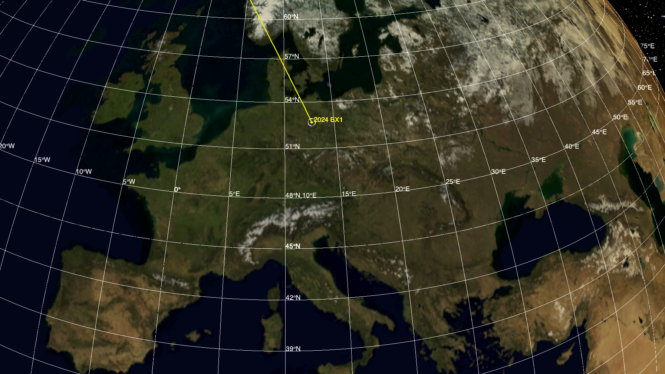4 min read
Preparations for Next Moonwalk Simulations Underway (and Underwater)

The Scout impact assessment system calculated where and when the asteroid 2024 BX1 would impact Earth’s atmosphere, providing a useful demonstration of planetary defense capability.
A small asteroid about 3 feet (1 meter) in size disintegrated harmlessly over Germany on Sunday, Jan. 21, at 1:32 a.m. local time (CET). At 95 minutes before it impacted Earth’s atmosphere, NASA’s Scout impact hazard assessment system, which monitors data on potential asteroid discoveries, gave advance warning as to where and when the asteroid would impact. This is the eighth time in history that a small Earth-bound asteroid has been detected while still in space, before entering and disintegrating in our atmosphere.
The asteroid’s impact produced a bright fireball, or bolide, which was seen from as far away as the Czech Republic and may have scattered small meteorites on the ground at the impact site about 37 miles (60 kilometers) west of Berlin. The asteroid was later designated 2024 BX1.
While NASA reports on near-Earth objects (NEOs) of all sizes, the agency has been tasked by Congress with detecting and tracking NEOs 140 meters in size and larger that could cause significant damage on the ground if they should impact our planet. Those objects can be spotted much further in advance than small ones like 2024 BX1.
Tiny asteroids like this one impact our planet from time to time. They pose no hazard to life on Earth but can provide a useful demonstration of NASA’s planetary defense capabilities such as Scout’s rapid-response trajectory computation and impact alerts.
How It Was Predicted
The asteroid 2024 BX1 was first observed less than three hours before its impact by Krisztián Sárneczky at Piszkéstető Mountain Station of the Konkoly Observatory near Budapest, Hungary. These early observations were reported to the Minor Planet Center – the internationally recognized clearinghouse for the position measurements of small solar system bodies – and automatically posted on the center’s Near-Earth Object Confirmation Page so that other astronomers could make additional observations.
Scout, which was developed and is operated by the Center for Near Earth Object Studies (CNEOS) at NASA’s Jet Propulsion Laboratory in Southern California, automatically fetched the new data from that page, deducing the object’s possible trajectory and chances of impacting Earth. CNEOS calculates the orbit of every known NEO to provide assessments of potential impact hazards for the Planetary Defense Coordination Office (PDCO) at NASA Headquarters in Washington.
With three observations posted to the confirmation page over 27 minutes, Scout initially identified that an impact was possible and that additional observations were urgently needed. As astronomers across Europe reported new data to the Minor Planet Center, the asteroid’s trajectory became better known and the probability of its impacting Earth significantly increased.
Seventy minutes after 2024 BX1 was first spotted, Scout reported a 100% probability of Earth impact and began to narrow down the location and time. As tracking continued and more data became available over the next hour, Scout improved estimates of the time and location. Since the asteroid disintegrated over a relatively populated part of the world, many photos and videos of the fireball were posted online minutes after the event.
Tracking NEOs
The first asteroid to be discovered and tracked well before impacting our planet was 2008 TC3, which entered our atmosphere and broke up over Sudan in October 2008. That 13-foot-wide (4-meter-wide) asteroid scattered hundreds of small meteorites over the Nubian Desert.
In early 2023, another tiny asteroid, designated 2023 CX1, was detected seven hours before it entered Earth’s atmosphere over northwestern France. As with 2024 BX1, Scout accurately predicted the location and time of impact.
With NEO surveys becoming more sophisticated and sensitive, more of these harmless objects are being detected before entering our atmosphere, providing real exercises for NASA’s planetary defense program. The details gathered from such events are helping to inform the agency’s mitigation strategies should a large and hazardous object on a collision course with our planet be detected in the future.
More information about asteroids, near-Earth objects, and planetary defense at NASA can be found at:
https://science.nasa.gov/planetary-defense
News Media Contacts
Ian J. O’Neill
Jet Propulsion Laboratory, Pasadena, Calif.
818-354-2649
ian.j.oneill@jpl.nasa.gov
Karen Fox / Charles Blue
NASA Headquarters
karen.c.fox@nasa.gov / charles.e.blue@nasa.gov
2024-006










